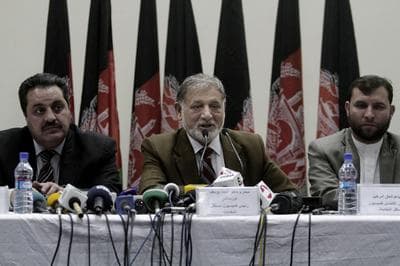Advertisement
Getting Out Of Afghanistan
ResumeAfghanistan and Pakistan are still brewing up big challenges for the United States. Taliban talks, drone wars, how to stay in, how to get out.

Pakistan’s prime minister at the White House today. A tough relationship. And Amnesty International, raising a “war crimes” flag over American use of drones in the prime minister’s outback. It all ties in to the big American interest in the region, right across the border in Afghanistan. After a dozen bloody years of costly sacrifice, the US is now moving rapidly toward its big drawdown in Afghanistan. Its pullout. The formal suggestion is they’re set, and we can go. The reality is much tougher. My guest today says cut a deal with the Taliban, or get out right now. Up next On Point: leaving Afghanistan.
-- Tom Ashbrook
Guests
Ben Pauker, managing editor of Foreign Policy Magazine. (@BenPauker)
Stephen Biddle, Senior Fellow for Defense Policy at the Council on Foreign Relations, Professor of Political Science and International Affairs at George Washington University.
Sean Carberry, Kabul correspondent for NPR. (@Frankentele)
From Tom's Reading List
Foreign Affairs: Ending the War in Afghanistan — "Should current trends continue, U.S. combat troops are likely to leave behind a grinding stalemate between the Afghan government and the Taliban. The Afghan National Security Forces can probably sustain this deadlock, but only as long as the U.S. Congress pays the multibillion-dollar annual bills needed to keep them fighting. The war will thus become a contest in stamina between Congress and the Taliban."
The Atlantic: Why Is It So Hard To Negotiate With The Taliban? -- "At the beginning, talks were just seen as a way to peel off local and regional commanders and local insurgents from the broader movement, and it slowly worked its way up the chain from reintegration to reconciliation. But it did so unevenly and it was never properly explained how these negotiations at the lower level would play out at the higher level. We didn't know whether the purpose of talks was to split the Taliban movement between the hawks and the doves or to try to maintain a coherent movement under [Taliban spiritual leader] Mullah Mohammad Omar and talk directly to the top."
The Guardian: US drone strikes could be classed as war crimes, says Amnesty International -- "Getting to the bottom of individual strikes is exceptionally difficult in the restive areas bordering Afghanistan, where thousands of militants have settled. People are often terrified of speaking out, fearing retribution from both militants and the state, which is widely suspected of colluding with the CIA-led campaign."
This program aired on October 23, 2013.